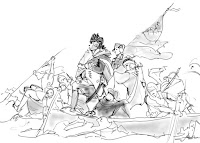In December 1776, George Washington was preparing to lead the Continental Army against the Hessians at Trenton, New Jersey in the war for independence from British oppression. During this time, American morale was low. The Continental Army had been driven from New York and was forced to retreat across New Jersey. Despairing that the cause of independence had been lost, many men had deserted. Even General Washington was beginning to lose hope.
Here is an account of what General Washington might have been thinking, as excerpted from my book, Beyond the Cherry Tree: The Leadership Wisdom of George Washington.
By mid-December 1776, only five months after the Declaration of Independence had been signed, it seemed as though our fight for freedom was all but lost. The overwhelmingly powerful British Army had repeatedly beaten us in New York, and then had driven us from pillar to post all across New Jersey. Now we were on the Pennsylvania side of the Delaware River. The British and their hired mercenaries, the Hessians, were camped just across the river — very close to our capital, Philadelphia.
From the beginning, soldiers had been discouraged to the point of utter despair, as was our entire fledgling country. Our soldiers and civilians alike were ready to give up our vision quest for freedom and independence. The British had offered amnesty to all those who would re-swear allegiance to the crown. Many citizens had already signed oaths of re-allegiance to the British and many more planned to, believing that future resistance was hopeless. Our cause appeared lost.
The Continental Army—our only hope for freedom from British tyranny—had been defeated in New York City that summer and fall of 1776 by overwhelmingly superior forces. We were kicked from pillar to post as we retreated all across New Jersey toward Pennsylvania.
Our men were freezing, as they were half-naked and wearing worn out summer clothes. They were hungry. All were miserable. Many had no shoes. You could trace the progress of our army by the bloody footprints left behind on the snow and ice. A large number of our men had been killed or wounded in battle, many others had died from diseases or were very ill, and others had deserted by merely walking home undetected.
During this ordeal of fighting and retreating, we had lost nearly 90% of our army plus most of our cannon, ammunition, winter clothes, and tents — and much of everything else that soldiers need. Despair had gripped my soldiers. Their enlistments would expire in about two weeks on January 1, 1777.
As I walked among them, I heard many of them say that they could hardly wait to go home. If they left, then our cause was lost. We would have no army. The existence of our Continental Army was all that gave legitimacy to our struggle for independence. I had to keep it in the field!
Panic had also spread throughout our citizenry. Many had signed oaths of re-allegiance to the King. These were the blackest of days. Thomas Paine, who accompanied our army as it retreated, wrote the “The American Crisis,” at night while seated at the campfire. It begins with these immortal words, “these are the times that try men’s souls.”
If we sat idle here on the Pennsylvania shore or retreat further west, we would be safe—but only temporarily. The British would again pursue us in the spring. I refused to let the flame of freedom flicker out. We must strike a blow against them to boost our morale — but where, when and how?
Fortunately for us, in early December the British and their Hessian mercenaries decided to go into winter quarters. This was normal procedure for European armies. They established isolated outposts all across New Jersey to subjugate the citizens. One outpost, manned by their Hessian mercenaries, was at Trenton just across the river from us.
This presented a potential target too good to resist. It was relatively weakly manned by about 1,200 soldiers. I gathered my staff and we discussed the risks of attacking there. Normally, we would not risk all on one venture but here we had no choice. We were in a do or die situation. We adopted the code “Victory or Death.”
We decided to take everything we had across the river and attack at dawn the morning after Christmas.
____________________________________________
Website: Leadership by George!
Winner of the Freedoms Foundation at Valley Forge Medal of Honor
Member: National Speakers Association, American Society for Training and Development 


No comments:
Post a Comment
Thank you for your comments. They will appear once they have been approved.